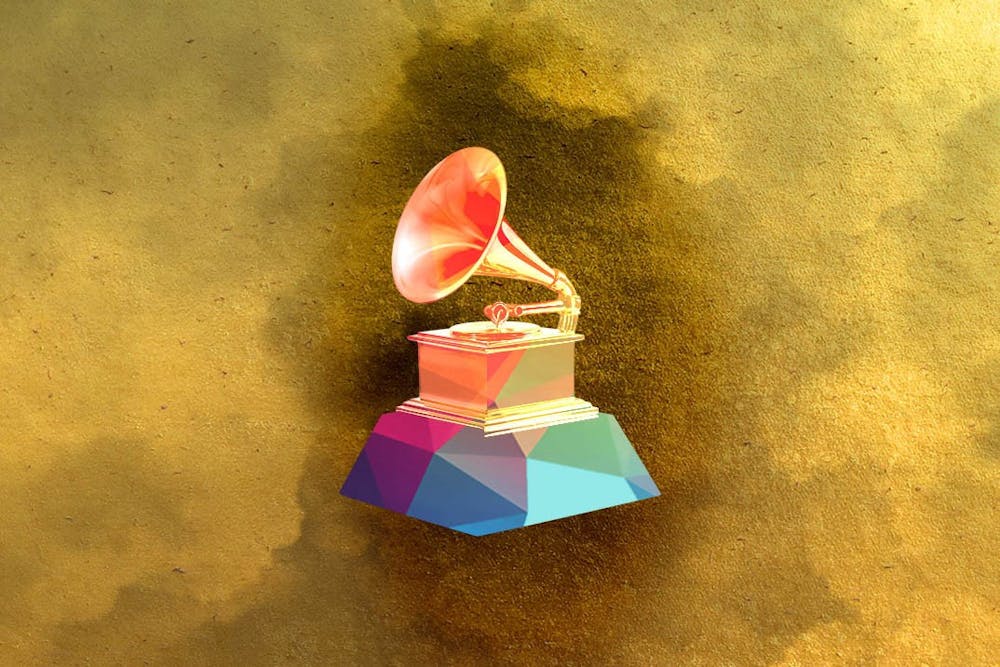For years, music cynics have cried frustrated phrases like “Popular music today is just not as good as it used to be!” But it was clear from the opening minutes, the 63rd Annual Grammy Awards busted the legs out from underneath that lazy proclamation.
An abnormally performance-laden telecast from the Recording Academy kicked off Sunday at the Los Angeles Convention Center, across the street from the Staples Center, the arena where it has been most frequently held.
There, Harry Styles performed “Watermelon Sugar,” simultaneously looking the part of Michael Jackson and Elvis Presley, with stage chemistry unmatched by other solo male artists in the mainstream music scene. HAIM carried a performance that would've pleased audiences from decades past, and Billie Eilish stripped vintage subtlety by performing her Grammy-winning track “everything i wanted” atop an aging muscle car.
The Grammys proved pop music is not dead — it is changing, and the Recording Academy needs to keep up.
After a history of criticism for a lack of Black artist representation, everything seemed to be going right at the 63rd Grammys.
Mickey Guyton, the first Black female artist to be nominated for Best Country Solo Performance, spearheaded a trio of country performances with her track “Black Like Me.”
Lil Baby and Killer Mike boasted incredible cinematography and poignance in their performance of the former’s "The Bigger Picture."
But these strides feel performative when painted alongside the patronizing words of Recording Academy interim president and CEO Harvey Mason Jr.'s speech: “Work with us, not against us.”
Actions could have spoken louder than words, and one of the most noticeable actions came via the absence of one of music's biggest stars.
The Weeknd, fresh off a Super Bowl halftime performance, was egregiously not nominated for an award despite critical and commercial acclaim for his 2020 album “After Hours.”
The artist told the New York Times he will be boycotting future Grammys because of “secret committees” that even Mason Jr. admitted to Variety were at fault for The Weeknd’s absence. These flaws within the selection process built to a climax when the biggest award of the night, Record of the Year, went to Billie Eilish over Megan Thee Stallion and Beyoncé’s “Savage Remix.”
Eilish said she felt embarrassed, facepalming before taking time to congratulate Megan Thee Stallion, calling the Houston rapper’s past year “untoppable” and bluntly adding, “You deserve this.”
This was a stain on the Recording Academy’s resumé, coming a week after CNN Business reported a study by the USC Annenberg Inclusion Initiative highlighting the disproportionately low number of major awards given to Black artists in spite of the commercial popularity of Black musicians.
Regardless of their loss for Record of the Year, Beyoncé and Megan Thee Stallion stole the show. Beyoncé claimed the record for most Grammys won by a female singer in the program’s history.
Megan Thee Stallion's and Cardi B’s “WAP” performance, alongside awkward commentary by host Trevor Noah and what can only be described as a continental king-sized bed, was memorable and wildly intricate. Megan Thee Stallion also became the first female rapper to win Best New Artist since Lauryn Hill in 1999 and took home the award for Best Rap Song for “Savage Remix.”
Despite a shaky night for the academy, Beyoncé and Megan Thee Stallion led what was a dominant night for women in the music industry.
Female artists swept all four of the biggest categories: Album of the Year, Song of the Year, Best New Artist, and Record of the Year.
Taylor Swift became the first woman to win three Album of the Year Grammys, deservedly taking home hardware for “folklore,” an album with such melancholy it mirrored 2020 as a whole.
READ MORE: Review: 'folklore' is what Taylor Swift was meant to do
The genre-fluid protest ballad “I Can’t Breathe” from H.E.R. took home the award for Song of the Year, and the Best Country Album and Best Rock Performance categories each featured a lineup of all female nominees.
The show continued to highlight the future of the music industry while uprooting the flaws with its present.
Noah gave moments of awareness on behalf of the Recording Academy, joking about artist royalties from streaming services and introducing owners from independent music venues struggling amid the pandemic as award presenters.
Doja Cat’s robotic rendition of the TikTok dance moves to her smash hit “Say So” underlined social media's impact on pop music. Meanwhile, Bad Bunny’s vibrant act and an opulently choreographed performance by K-pop group BTS highlighted the globalization of music.
Despite the Recording Academy’s still-flawed selection process and borderline manipulative self-aggrandizement, there was a silver lining from the four hour event.
The emphasis on performance embodied the current metamorphosis of the music industry. By doing away with gimmicks, skits and time-filling, the show gave way to live music instead, something fans have been lacking for 12 months.
The 63rd Grammys provided a foundation for future program blueprints — fill music’s biggest stage with the artists themselves, and the rest will fall into place.
Reach the reporter at ghanevol@asu.edu and follow @GannonHanevold on Twitter.
Like The State Press on Facebook and follow @statepress on Twitter.
Continue supporting student journalism and donate to The State Press today.




